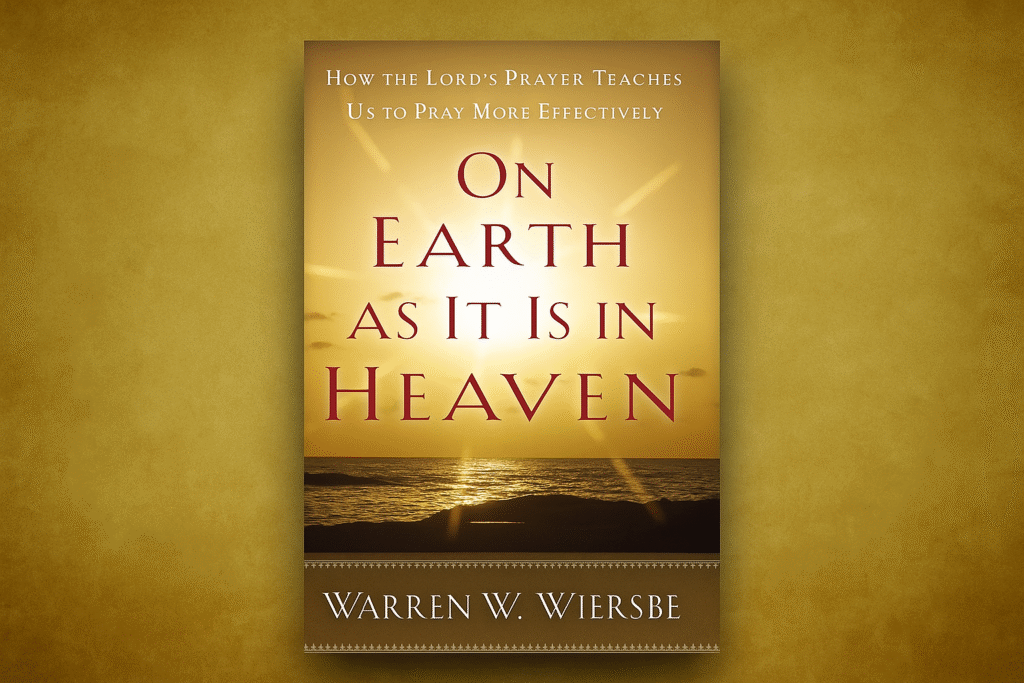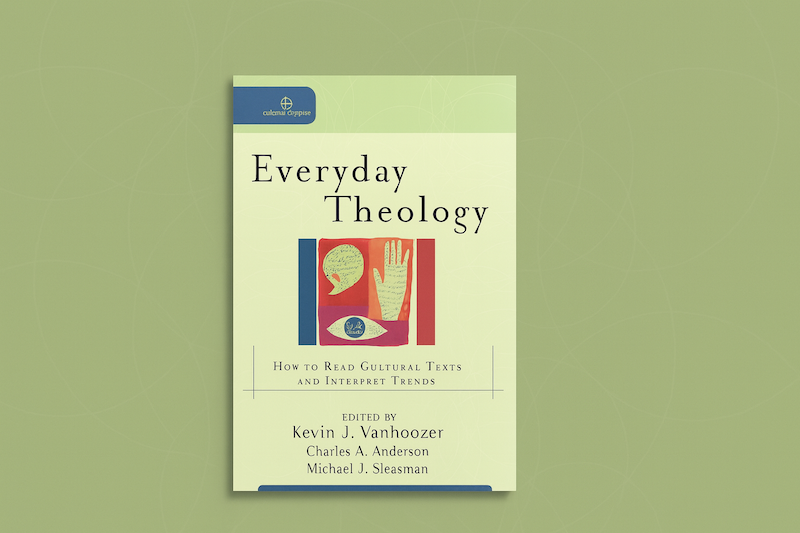
Prayer is something we all do instinctively. But for most followers of Jesus, there’s a yearning to learn how to pray well—how to pray effectively. Effective prayers are those that bring deep transformation, surrender us more fully to God, and pierce through the invisible ceilings that so often seem to block our cries. In On Earth as It Is in Heaven, the late Warren W. Wiersbe explores how the Lord’s Prayer provides a blueprint for effective prayer. Released in 2020 by Baker Books, this concise but meaningful work is dedicated to the “faithful remnant” of Jesus followers who are “unrecognized and underappreciated” (p. 5). Wiersbe reminds us that true, effective prayers glorify God, overcome the enemy, hasten the spread of the Gospel, and build Christ’s Church.
A Practical Theology of Prayer
Wiersbe’s approach is both theologically deep and pastorally tender—similar in tone to writers like Eugene Peterson. His writing style encourages reflection, personal growth, and spiritual maturity through prayer. The book includes a preface and eleven chapters, each tied to one phrase or petition from the Lord’s Prayer. The chapters—creatively titled “Measuring a Miracle,” “Relationship I & II,” “Worship,” “Citizenship,” “Partnership,” “Stewardship,” “Fellowship,” “Discipleship I & II,” and “Benediction”—indicate that for Wiersbe, effective prayer is deeply tied to right relationship and intentional discipleship. In the preface, he sets the tone: “If we want to keep maturing in the Christian life, we must be serious about developing our prayer life” (p. 9).
Prayer Begins with Relationship
In “Measuring a Miracle,” Wiersbe introduces the necessity of prayer in the Christian life. He reminds us that prayer is not optional—it is an obligation, a privilege, and an invitation to participate in the miraculous. He writes, “Prayer isn’t an option; it’s an obligation and an opportunity… to participate in miracles” (p. 12).
In “Relationship I & II,” Wiersbe establishes the relational starting point of prayer. Addressing God as “our Father in heaven” holds both intimacy and awe. He writes, “The phrase ‘our Father’ speaks of God’s nearness to us, while the phrase ‘in heaven’ speaks of his distance and difference… both truths must be kept in balance” (p. 29).
Worship: Honoring God’s Name
The chapter on worship dives into what it means to “hallow” God’s name. “To hallow something means to set it apart as special… to consecrate it to God” (p. 52). Wiersbe rightly frames this as an act of reverence and alignment. However, I found his treatment a bit lacking in connecting this to the Old Testament call to carry God’s name with integrity. Still, his reminder is strong: “God’s name is not only majestic; it is also glorious” (p. 52).
Citizenship: Longing for God’s Kingdom
In this chapter, Wiersbe reflects on the petition “Your kingdom come.” God’s Kingdom is both “already” and “not yet,” and we are citizens of that unfolding reality. “The Father doesn’t just give us a kingdom ID card or kingdom address…He gives us the kingdom!” (p. 63). Prayer here becomes an act of surrender and a confession that we must lay down our own kingdoms. “To limp between the kingdom of God and the kingdom of this world is to miss the best of both” (p. 72).
Partnership with God’s Purposes
Prayer as partnership means aligning our will with God’s. Wiersbe writes, “Prayer is a partnership between God and his church… through the witness of his obedient people” (p. 78). Our prayers not only seek God’s will—they invite us to be part of its fulfillment. This is where prayer moves from passive hope to active participation.
Stewardship: Daily Bread and Divine Provision
Wiersbe’s chapter on “Give us today our daily bread” emphasizes the stewardship of both physical and spiritual resources. “Bread represents all that we need to sustain life as we serve the Lord” (p. 91). I appreciated his call to “waste nothing” (p. 93). However, I wish he had explored more of the first-century context, especially how the call to pray for daily provision invites us to share generously with others.
Fellowship: Forgiveness and Communal Integrity
The next petition—“Forgive us our debts”—focuses on fellowship. Wiersbe reminds us that this is a communal prayer. Our sins affect others, and if we neglect forgiveness, we create barriers to effective prayer. “A debt is a legal obligation, and every sinner is obligated… to do his will.” Wiersbe challenges readers to consider how unresolved sin can interrupt both spiritual growth and relational unity.
Discipleship: Facing Temptation and Evil
Wiersbe explores “Lead us not into temptation” and “Deliver us from evil” across two chapters, but I see these lines as intertwined—a Hebrew parallelism. The petitions are not two thoughts but one dynamic movement: not being overcome and being delivered. “God’s true children benefit from trials… and trials only deepen those roots” (p. 105).
He ties the ending back to the beginning, saying, “When we pray ‘Our Father,’ we must believe what we are saying—that our Father loves us and will provide for us and ultimately deliver us” (p. 131). Every line of the Lord’s Prayer must rest in the love of God.
About the Author
Warren W. Wiersbe (1929–2019) was a pastor, seminary professor, widely sought-after speaker, and the author or editor of more than 150 books. He is perhaps best known for his BE Commentary series, which continues to shape Bible study groups and preachers today. Wiersbe wrote from a lifetime of ministry, weaving together his theological training and personal prayer life with warmth and accessibility.
Why I Read This Book
As a Doctor of Ministry (DMin) student at Kairos University, I picked up On Earth as It Is in Heaven, hoping for more theological and historical context. Instead, I found a deeply pastoral and practical reflection on the Lord’s Prayer. My doctoral focus is on using the Lord’s Prayer as a framework for spiritual formation and communal discipleship. Though this book didn’t give me new information academically, it encouraged me with pastoral insights and a fresh reminder of the heart behind prayer. You can learn more about me and my doctoral journey here.
Some Critical Thoughts
I appreciate Wiersbe’s heart and his commitment to helping others grow in spiritual maturity. His warm tone and pastoral depth are evident throughout. That said, a few opening anecdotes in his chapters felt incomplete or unconnected. At times, his connections to other scriptures felt forced, and he didn’t spend enough time unpacking the historical or socio-political context of Jesus’ original audience. I also found his comment in the Worship chapter about prayer being “answered” when prayed in the right order (p. 47) potentially problematic. It risks turning the Lord’s Prayer into a formula rather than a framework. Finally, he refers to the “daily bread” line as the “heart of the prayer” without backing up why. Despite these minor critiques, the book is valuable for the average churchgoer more than the scholar—and that seems to be his intended audience.
Readability and Layout
This is a highly readable book. Each chapter focuses on a single phrase of the Lord’s Prayer and ties it to broader biblical themes. The layout is clear, with thoughtful chapter divisions and a well-written preface. Wiersbe’s pastoral voice keeps things engaging while inviting deeper reflection.
Final Thoughts and Recommendation
Warren W. Wiersbe’s book, On Earth as It Is in Heaven, is a prayerful guide to rediscovering the Lord’s Prayer not just as words we recite, but as a powerful rhythm for our lives. While it may not satisfy those looking for rigorous historical or theological exegesis, it is ideal for everyday believers wanting to deepen their relationship with God through prayer. I recommend this book for small groups, personal devotionals, and anyone wanting to explore prayer as an effective way to realign our lives to relationship and discipleship.



